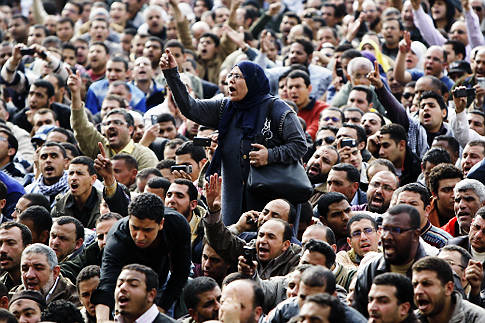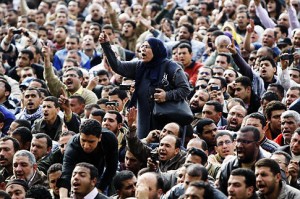The “Arab Spring” and the Church – by Cynthia Holder Rich and Mark Rich
Read Duncan Hanson’s Essay, “Middle Eastern Christians and the Arab Spring”
Read Noushin Darya Framke’s Essay, “Liberation Technology: Revolution by Tweet”
Revolution, struggles for freedom, undying hope – the “Arab Spring” which began early this year in Tunisia has blossomed into a multifaceted movement, which no one expected nor hardly thought possible. There is much to remember and on which we can reflect in this developing narrative.
There are the poignant moments – the self-immolation of a young man in Tunisia whose only means of supporting his family was taken from him that started it all; the peaceful protests in Tahrir Square in Cairo, which turned into a joyful and all-encompassing celebration for freedom; the faces of young people in many countries who stood up and claimed power, found their voices and communicated both to those inside and those outside their countries about all that they were seeing, doing and experiencing; and the women, in many Arab countries, who stood shoulder to shoulder with men in the struggle.
There are also the heartrending and agonizing memories – of governments bringing out the military in efforts to quell revolution; the sheer amount of bloodshed and lives lost, in many cases to an extent that is unknown and information that is kept as much as possible out of the public view; and the ongoing frontal assault on human rights in many places that led to people rising up in the first place.
Now many months into the “Spring”, questions arise and persist.
- Should former dictators be “brought to justice” through judicial action? If so, what ends are being served? And under new governments which continue to evolve, what laws will be part of these processes? Who will serve as the judges? From whom will the courts receive the authority to proceed?
- In cases where military forces have taken power from civil forces, how should the “revolution” proceed when it becomes apparent that hoped-for freedoms are not being realized?
- How should the role of colonial governments during the 19th and 20th centuries be understood in the current struggles? Erin Hudson has written recently on both the issues of colonial policies and the postcolonial/neocolonial structural adjustment policies of the IMF and World Bank, and the role of these in providing impetus to revolution this year in Middle Eastern and North African contexts. What is the ongoing legacy of colonialism in what is transpiring now?
- What of the women? Women took part and are taking part in revolutionary uprisings in many countries – and many report now that not only are they not realizing increased freedoms and respect but that in fact, abuses have in some contexts become more numerous and grave. The move to push women more firmly and farther into traditional roles raises the question of whether revolution actually can improve life for women.
- How can revolution free people from poverty – or can it? Poverty is at the heart of the movement that led to the breaking open of this “Spring”time – after all, it was the loss of income to support a family that led to the opening suicidal protest. Months after the revolutionary movements began, people are waiting – sometimes patiently, but often not so – for the revolution to lead to increased equity and quality of life for those who have suffered multigenerational poverty. Those who seek a way out of poverty through revolution could find comfort in the recent history of Iran – a neighbor to many, whose wealth distribution evened out considerably
- What domino effect is there, how will it play out, and who will benefit and lose from the outcomes? Saudi Arabia is not eager for Bahrain to move into freedom; Turkey encourages Syria to stop cracking down; and after months of nervous preemptive response, Palestine asked for recognition of its statehood at the UN, a move that US President Obama spoke against. The geopolitical machinations, concerns and fears that the impetus toward freedom in so many places has engendered is awe-inspiring, can create a context for praise and thanks to God, and in other places can create or increase terror and oppression.
- What is the impact of social media, and how does it operate, for good or for ill, in contexts of revolutionary uprising? Brooke Gladstone and Bob Garfield debated this on their radio program, On the Media, earlier this year. The internet and social media are available to all and are, almost by definition, unregulated. On the program, examples of tweets and Facebook status updates of people engaged in revolution were shown to be less than completely accurate, and the use of social media by governments to influence, reverse or confuse public opinion was discussed. There are, then, many dangers in the use of social media – and there is real power to communicate and share truths with the wide world which repressive governments would rather keep under wraps. Noushin Framke will comment more on this later this week.
- And what of religious freedom? In countries which were officially “secular”, religious minorities, including Christian churches, were officially “protected”. This meant different things in different places. In some countries, Christians were afforded freedom to take part in religious ritual. As some of the countries where revolution is taking place are leaning toward more strict observance of Islam, what will happen to religious minorities? Duncan Hanson will explore this in more depth later this week.
We who follow Jesus have to struggle with the meaning of revolution and struggles for freedom. While there are many factors to consider in terms of geopolitical relationships and strategic alliances, the calculations that discipleship call us to conduct are different.
As Reformed Christians, we understand that these uprisings, to the point that they are genuinely popular (that is, that they arise from the people – Latin populus), are the work of God’s Spirit and have the power of God within them and leading them. They are not merely the will of the flesh. All of their best ideals are the ideals we can readily recognize from the movement of the sovereign realm of God proclaimed by Jesus, even though Jesus is rarely (if ever) proclaimed as Lord in these movements. Key to this is that many (although clearly not all) of the movements have maintained a stance of nonviolence, even in the face of gross violence, bloodshed and loss of life, much of which has been government-sponsored.
This raises another of Jesus’ political principles – that those who first must be last, and those who are great must be the slaves of all. Jesus didn’t require any particular form of government, only that the constitutive substance of government must be service to all, especially to the most vulnerable. Any revolution or any form of government will be vulnerable as much as it fails to observe this principle. This is the only real and enduring basis for government of any kind. (Thoughtful readers will see the connection here from this round of uprisings with the entire current global economic crisis.)
A third point may be made, a more properly Islamic than Christian one which will sound familiar to those who belive and follow other Abrahamic faiths as well. Is it not time to declare that all dictatorships are inherently الشرك (shirk), idolatrous? Think of all the massive pictures and state control of media that all dictatorships require to maintain and proclaim their power – and to inspire fearful compliance with it. Is this not pure idolatry? And think also of how all idolatry leads eventually to death. Then remember the many, many uses dictators make of death. Does this not show us that dictatorships are shirk incarnate?
Finally, the issue of power must be explored. This tosses us back to the colonial era, when these countries were part of a global game largely played by white men from Europe and the US. We can go farther back to the era, long before that which has been labeled “colonial” (generally understood as the 19th and 20th centuries), in which conflict for religious dominance took place across the region; and to the time when the Spice Trade routes were travelled by caravans and fought over by those who sought power and wealth. Alliances of power during the Cold War continue to impact current understandings and misunderstandings, making some defensive to the point of violence and others nervous about whether alliances with powerful western nations will be able to withstand popular uprisings and protect those in power – who are, in many cases, governments who have oppressed the vulnerable as official state policy in order to control and expand wealth for the few.
There is much to explore here. There is much to confess here. Christians in the US are called to search ourselves for the ways in which we have been comfortably ignorant of the pain and suffering of God’s children in the region, the same children who are now rising as “Springtime” lengthens into autumn. We have benefited, materially and politically, from the policies of our government in collaboration with oppressive and violent governments across the region. The church is called to a better, more excellent way.
Read Duncan Hanson’s Essay, “Middle Eastern Christians and the Arab Spring”
Read Noushin Darya Framke’s Essay, “Liberation Technology: Revolution by Tweet”


